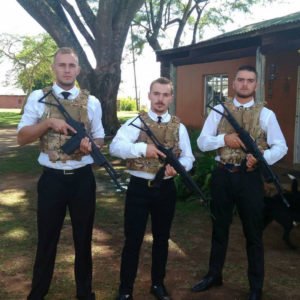VIP Protection / Close Protection Officer (CPO)
VIP protection or the protection of a very important person (VIP) is an exciting and tactical training course at Milites Dei Academy. A Close Protection Officer (CPO) is a known term for finished students. The VIP is also called the Principal. Accordingly, you will provide protection to a designated person. VIP protection is known as executive protection in other countries.

This Close Protection Officer occurs in the following instances and that is also the modules on offer at Milites Dei academy:
- US 246694 – Becoming a security provider;
- US 244317 – Static close protection is protection at a venue;
- US 244319 – Whilst in transit, here the CPO needs to know how to manoeuvre with a car and in a convoy of cars;
- US 244327 – The VIP will also at times move on foot and then the CPO will do pedestrian escorts;
- US 244334 – The VIP protector or CPO will also protect the VIP / Principal when embussing and debussing; and
- US 376480 – The VIP’s life is in hands of the CPO and thus first aid is also a very important part.
Register with MDA and get the following at no extra cost:
• Close Protection Combat
• Tactical Fire and movement
• Various Military-Style Skills
The VIP Protection or CPO course further will teach you to really understand your Principal. Duffy (2007) explains:
“Once you have determined the individuals who need protection, you need to know everything about their public and private lifestyles. This is called creating a “principal profile,” and it requires the executive’s full cooperation. You need to know everything about his work and home lives—everything from detailed information about his home, his family’s habits and any organizations and clubs he frequents. It’s also important to investigate how easy it is for outsiders to get information on your principal and his family.”
Furthermore, you will set up an operations room, have protection-, contingency- and communication plans in place, understand maps of areas and routes, you will be able to apply close quarter battle techniques, self-defence, close quarter combat, and legal and defensive arresting techniques, overt- and covert operations, search venues and areas, apply situational awareness and move tactically with your VIP.
Zelvin (2011) writes:
“When a client hires them for protection during, say, a three-day visit to New York, the firm starts by getting a detailed schedule and sending out an advance team of two or three operatives to analyze, measure, map, and if possible photograph the details of every venue the client expects to visit, especially the approaches: the principal, as the subject is called, is most vulnerable when entering and leaving the venue. The team that protects the principal during the visit is thoroughly briefed beforehand.”
An old friend (Anonymous 2020) of Milites Dei Academy that presently protect VIP’s in Southern Africa, states:
- Don’t overdo;
- You’re a CPO not a bouncer;
- Professionalism at all times;
- Less talk more observant;
- Client safety always comes first. Using overt or covert techniques; and
- The client is always right (be patient you fall in with the client not the client with you).
Unger (2020), presently serving ten years as a tactical expert gives the following advice to new CPO’s:
- Network well in advance of the course completion;
- Continue with training and development;
- Maintain physical and mental readiness;
- Learn new skills; and
- Exercise etiquette always.
References
Anonymous (2020). Tips for new CPO’s. Conversation with the author.
Duffy, Daintry (2007-12-19). “The Six Things You Need to Know About Executive Protection” Archived at the Wayback Machine. CSOonline, April 1, 2005. Accessed May 26, 2020.
Unger, Kyle (2020). Tips for new CPO’s. Conversation with the author.
Zelvin, Elizabeth (2011-11-19). “Executive Protection”. New York: Management Resources Ltd. Accessed May 26, 2020.
